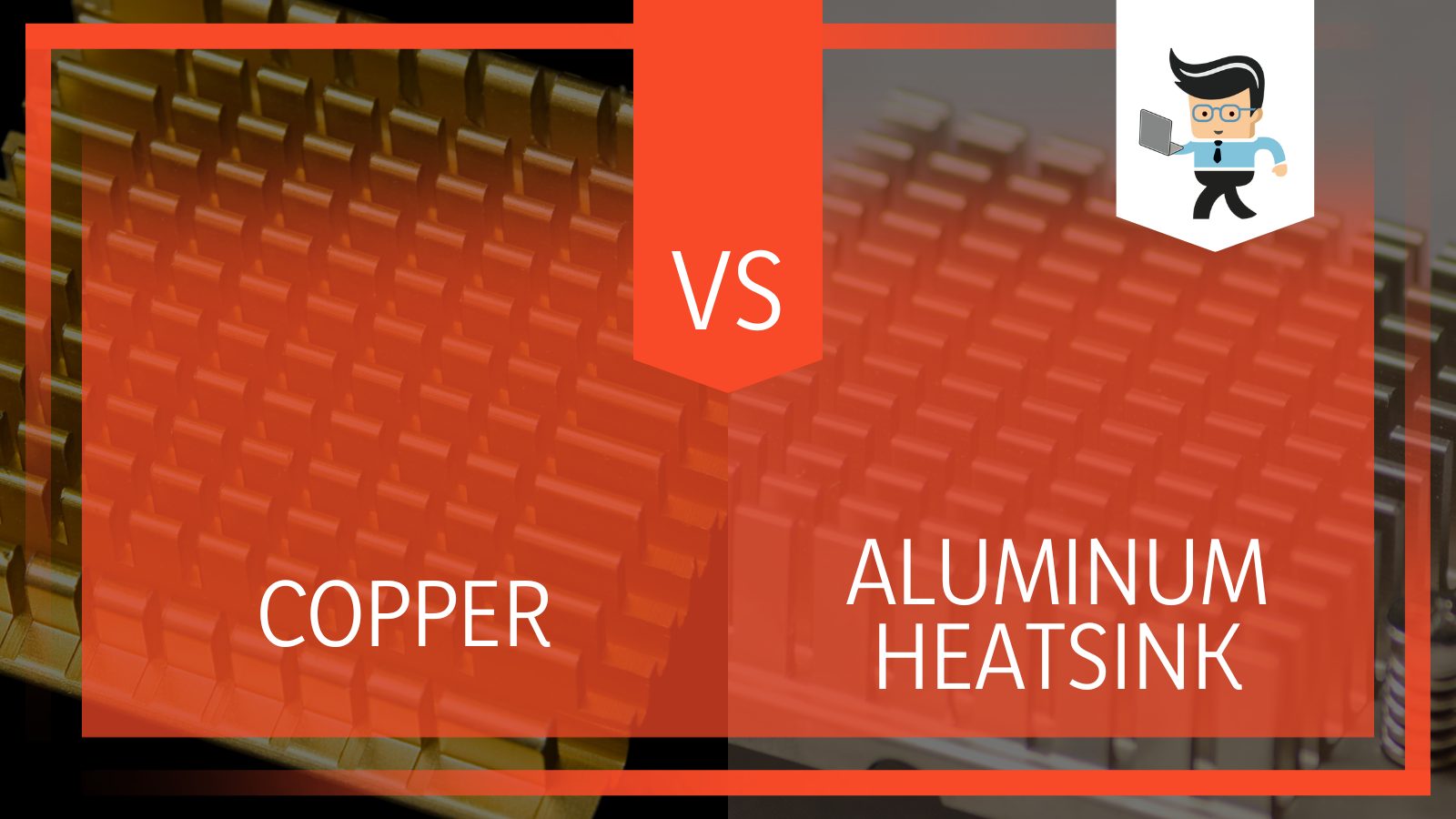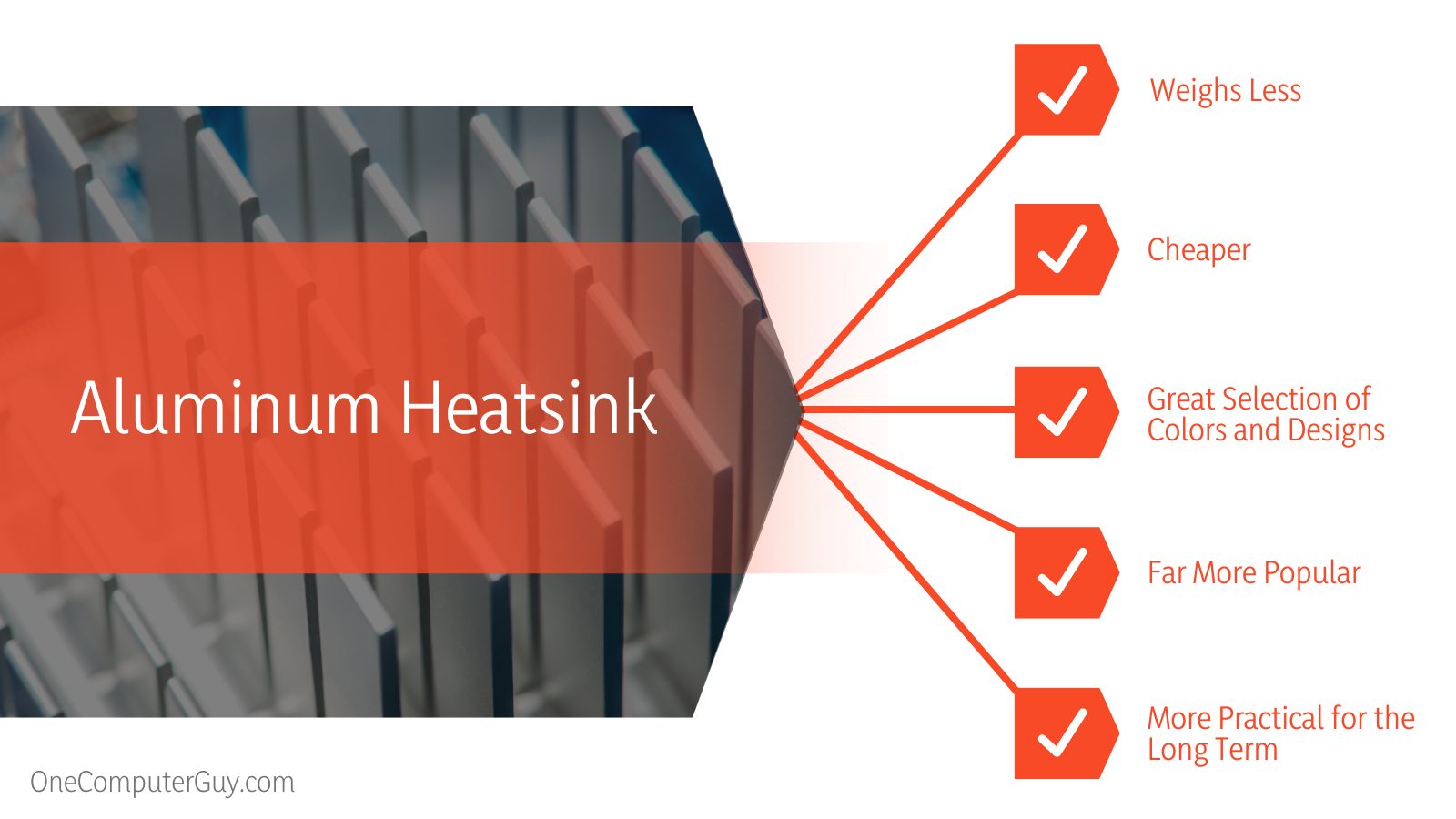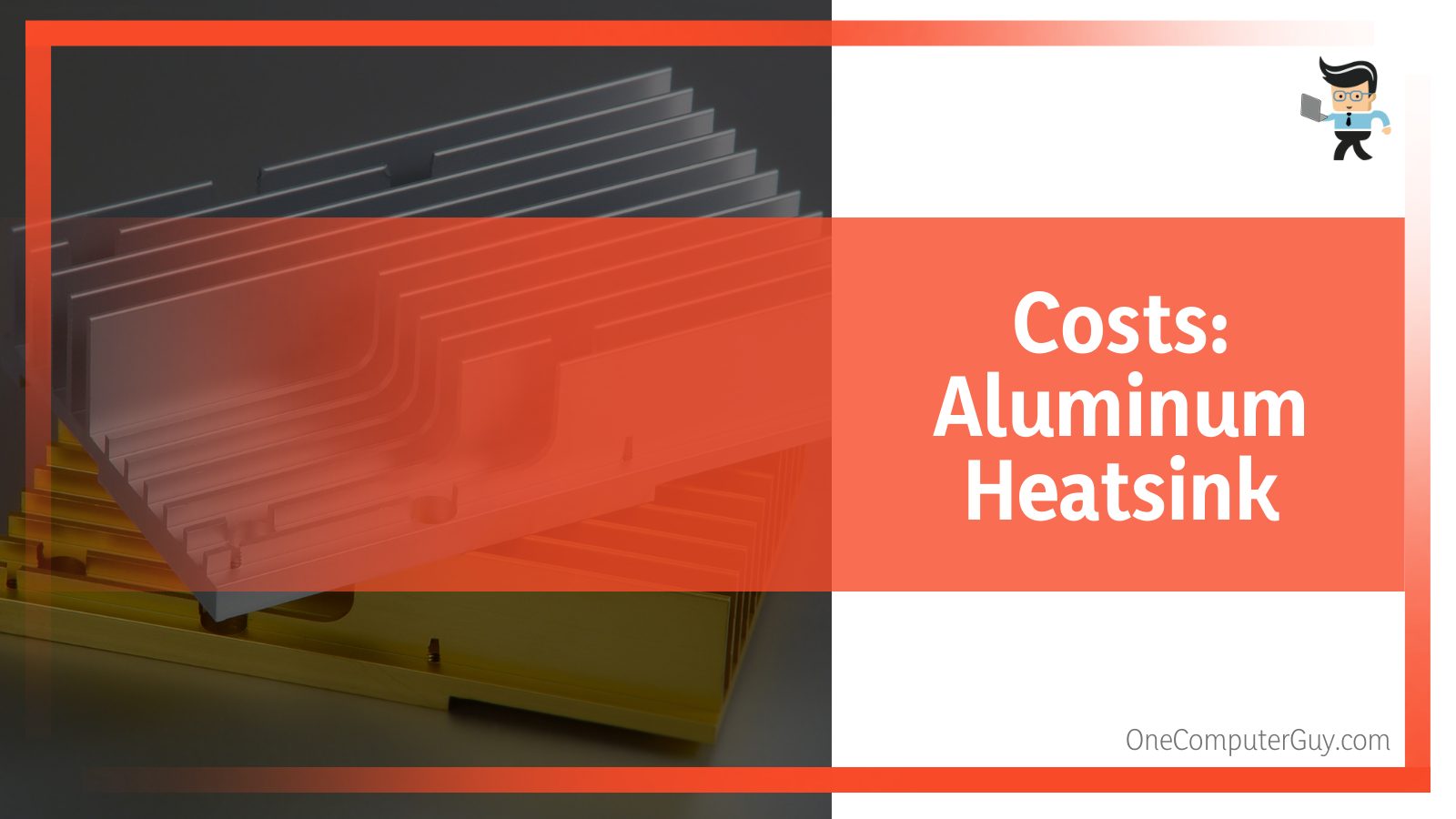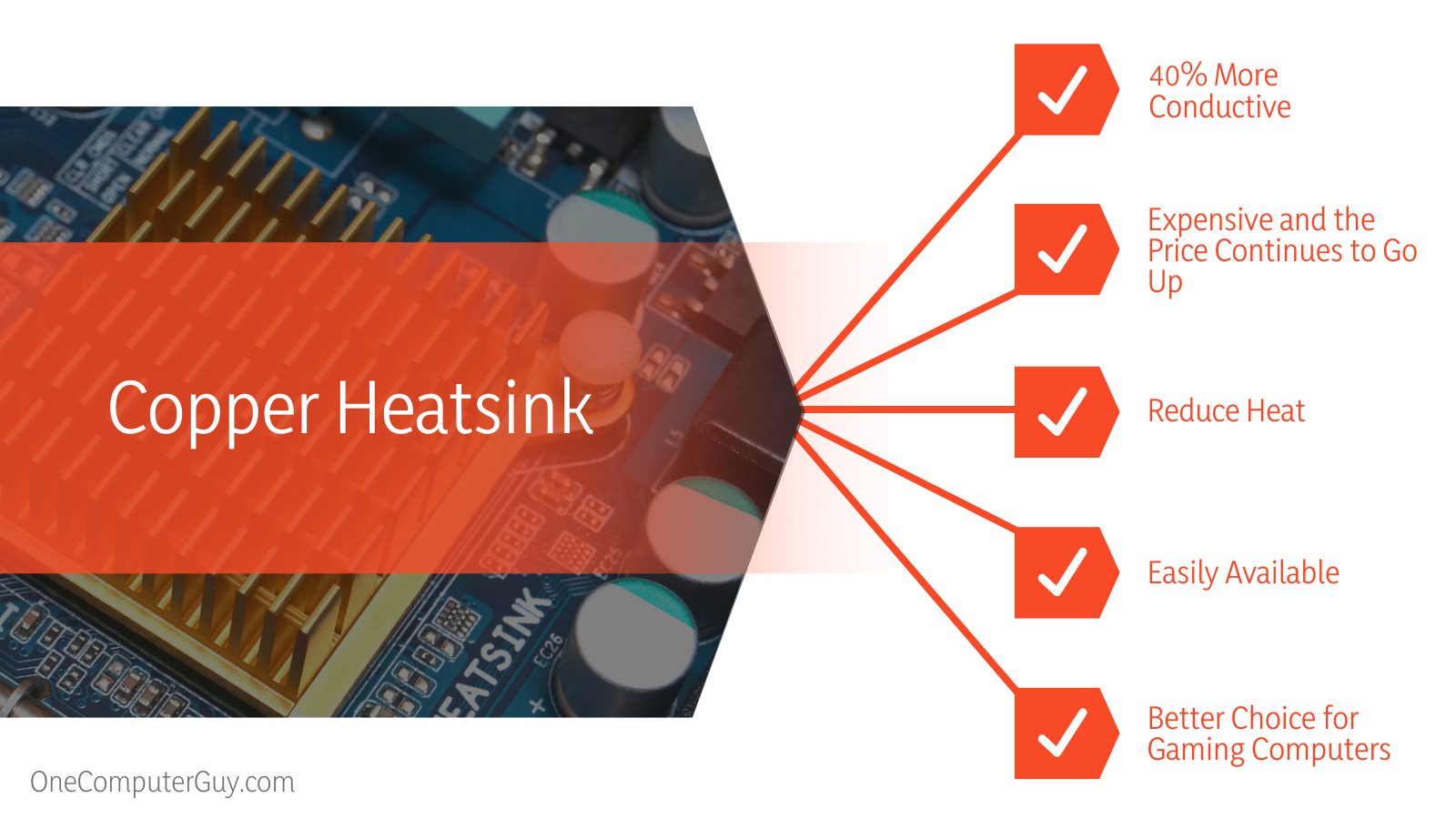Your computer generates a ton of heat, so understanding how copper vs aluminum heatsink works is important.

You want to use a heatsink material that’s good for conductivity and works well with the rest of your computer. Some materials have great thermal conductivity, but are too heavy or too expensive to help with your build.
While copper tends to be better for heat conductivity, aluminum is the most popular option for most people.
Why is that?
We’ll break that down and more in this article. Continue reading to see whether you should get a solid copper heatsink or if the aluminum heat conductivity is good enough.
| Product | Key Specifications |
| Copper Heatsink |
|
| Aluminum Heatsink |
|
Contents
What Is a Heatsink and How Does It Work?
A heatsink is basically used to prevent overheating in heat-generating machines such as computers.
Heatsinks use different methods to help dissipate the hot air generated by various components of a computer. Heatsinks are made out of a metal material that carries heat away from a CPU. All metals have slightly different conductivity rates. Thus heatsinks work faster or slower, depending on the metal used.

The heatsink collects heat in the area. The fan then moves the air through it and out of the computer. Most computers will have an additional fan installed above the heatsink to help keep everything cool. This is called an “active heatsink,” and they are common for aluminum heatsinks. Passive heatsinks are usually copper.
Without heatsinks that actually work and aren’t just there to look good or provide style, most modern-day electronics (including computers, gaming systems, and even some medical equipment) would overheat very quickly and would burn out in a sense. They’d simply generate too much heat. Even if you were able to pay attention, the technology would heat up so quickly that you couldn’t stop it.
But heatsinks do even more than deal with hot temperatures. In some cases, they can help with temperature regulation in colder temperatures. They can release thermal energy to help warm up the components for adequate operation of the device in a pinch. They won’t be able to do this for an extended time, but they can in the short term.
So Which Metal Is Best for Heatsinks: Aluminum or Copper?
As with almost everything else in building a computer, there is no clear-cut answer for every single person. Choosing a copper or aluminum heatsink is a gray area. To help you select the best metal for heatsink, we’ve broken your options down into a few different categories.
When considering which one between a copper heatsink or an aluminum heatsink will give a boost to your computer’s performance, you need to ask yourself some questions.
They are as follows:
- What is my overall budget? How much of that budget am I willing to devote to a heatsink?
- What is the orientation of my board? (There are more options in aluminum.)
- How much weight is going to be on the heatsink and related hardware?
- What is the airflow in the rest of my case?
- What are the component dimensions and how do they fit into my overall design?
- What is my target temperature?
- Will I be overclocking and need more heat management?
For many people, the answer is that either of the two heatsinks will work. But to help you focus on what you actually need, here’s a detailed comparison of which material works better in various categories.
Heat Conductivity: Copper vs Aluminum Heatsink
-
Winner: Copper Heatsink
If we just look at conductivity, copper is far better than aluminum. In fact, it is at least 40% more conductive than aluminum. This doesn’t mean that all copper heatsinks are 60% more effective than the aluminum ones. The other materials that go into the heatsink (such as plastic) will have an impact on the conductivity as well.
Gaming generates a lot of heat in your computer. If you game, then it is important to reduce heat in every place you can. This means that a copper heatsink may be the better choice for you. Most gaming computers are starting to exclusively use copper, even if it is a little more expensive.
Weight: Copper vs Aluminum Heatsink
-
Winner: Copper Heatsink (only if you plan on bringing your computer around)
Weight is pretty negligible when buying a heatsink, but it is something to consider if you fly regularly. Aluminum isn’t nearly as dense as copper. If you are building a gaming laptop or looking for something that is extremely portable, then maybe you want to pay attention to that weight.
If you don’t plan on carrying your gaming computer around, then weight shouldn’t be a problem. In very rare cases, it may impact shipping costs.
Costs: Copper vs Aluminum Heatsink
-
Winner: Aluminum Heatsink
Copper is expensive and the price only continues to go up. Meanwhile, aluminum comes in at a third of the cost of copper, and you can clearly see that when you buy a heatsink.

When you are building your rig, you may want to cut costs where you can so that you can splurge on more important things. However, your cooling system is one place where you should focus on if you can.
So while aluminum heatsinks are cheaper, investing in a good cooling system is more practical for the long term.
Availability: Copper vs Aluminum Heatsink
-
Winner: Aluminum Heatsink
When you build your PC, there is something else that you need to take into consideration: availability. Of course you can get whatever you want online, but that doesn’t necessarily mean you will have plenty of options.
As aluminum heatsinks are far more popular than copper ones, you will have better options here. Not only will you just have a larger number of choices, you will find a great selection of colors, designs, costs, and more. You will be able to find something that goes along with your build in aluminum, but copper doesn’t have nearly as many choices.
If you aren’t picky, like if you are building a computer with a closed case, then you won’t really have to pay attention to this category.
What About a Copper-Aluminum Heatsink?
Another option is to get neither an all copper heatsink or an all aluminum heatsink, but a copper-aluminum hybrid. This is an aluminum heatsink that has copper embedded into it.
There aren’t many brands producing this type of heatsink, but it’s out there. It offers a faster heat conducting rate, is dense, and has good heat absorption, while still remaining lightweight, cheap, and convenient for most computer builders.
You can also use a mixture of different heatsinks within your computer, so long as everything communicates with each other. The bottommost heat sinks can have a copper base that touches the CPU, which keeps everything lightweight and improves heat conduction and absorption.
You don’t have to use a solid copper heatsink or a completely aluminum heatsink if you want to get the benefits of both.
Is the Difference Significant Enough to Warrant a Change?
One of the biggest questions you need to ask yourself when you are building a computer is whether or not the difference is enough that you want to change what you are used to when you build.

A copper heatsink is great, but you also want to consider whether you need it. If you already have a heatsink or a heatsink came standard, there may be no real need to change out to a copper version.
If you have noticed that your computer needs better heat control, you may not want to change the heatsink material right away. Instead, you would want to focus on installing a new cooling system or reducing the heat generated in other ways.
If you push your system through overclocking, you may want to focus more on cooling directly than passive cooling through heatsinks.
In Conclusion: Which Heatsink Is Right For You?
As you can see, there are a lot of reasons to invest in a copper heatsink, but aluminum continues to be extremely popular for other reasons.
Copper heatsinks are easily available and if you see some on the market that you like, there’s no reason not to get them. They can be used in many situations, particularly when your device is going to generate a lot of heat and won’t need a lot of transportation.
Aluminum is a cost- and weight-saving option, so if these factors are important to you, then you absolutely have to go with aluminum. You will also have a great number of options with aluminum, whereas you won’t have as many options with copper. There are very few situations in which an aluminum heatsink won’t be enough.







